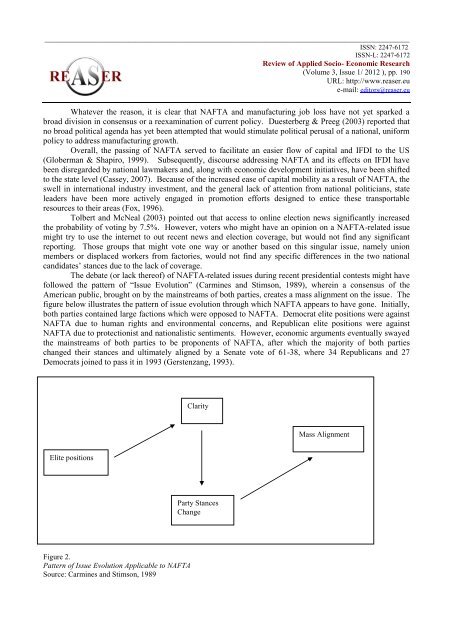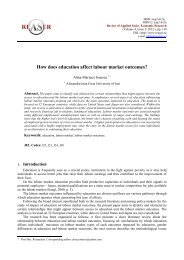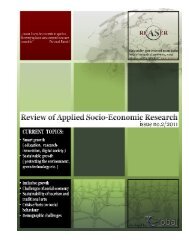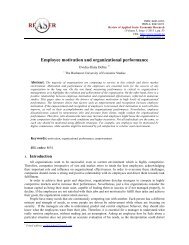Volume 3, ISSUE1/2012 - Review of Applied Socio-Economic ...
Volume 3, ISSUE1/2012 - Review of Applied Socio-Economic ...
Volume 3, ISSUE1/2012 - Review of Applied Socio-Economic ...
You also want an ePaper? Increase the reach of your titles
YUMPU automatically turns print PDFs into web optimized ePapers that Google loves.
________________________________________________________________________________________________<br />
ISSN: 2247-6172<br />
ISSN-L: 2247-6172<br />
<strong>Review</strong> <strong>of</strong> <strong>Applied</strong> <strong>Socio</strong>- <strong>Economic</strong> Research<br />
(<strong>Volume</strong> 3, Issue 1/ <strong>2012</strong> ), pp. 190<br />
URL: http://www.reaser.eu<br />
e-mail: editors@reaser.eu<br />
Whatever the reason, it is clear that NAFTA and manufacturing job loss have not yet sparked a<br />
broad division in consensus or a reexamination <strong>of</strong> current policy. Duesterberg & Preeg (2003) reported that<br />
no broad political agenda has yet been attempted that would stimulate political perusal <strong>of</strong> a national, uniform<br />
policy to address manufacturing growth.<br />
Overall, the passing <strong>of</strong> NAFTA served to facilitate an easier flow <strong>of</strong> capital and IFDI to the US<br />
(Globerman & Shapiro, 1999). Subsequently, discourse addressing NAFTA and its effects on IFDI have<br />
been disregarded by national lawmakers and, along with economic development initiatives, have been shifted<br />
to the state level (Cassey, 2007). Because <strong>of</strong> the increased ease <strong>of</strong> capital mobility as a result <strong>of</strong> NAFTA, the<br />
swell in international industry investment, and the general lack <strong>of</strong> attention from national politicians, state<br />
leaders have been more actively engaged in promotion efforts designed to entice these transportable<br />
resources to their areas (Fox, 1996).<br />
Tolbert and McNeal (2003) pointed out that access to online election news significantly increased<br />
the probability <strong>of</strong> voting by 7.5%. However, voters who might have an opinion on a NAFTA-related issue<br />
might try to use the internet to out recent news and election coverage, but would not find any significant<br />
reporting. Those groups that might vote one way or another based on this singular issue, namely union<br />
members or displaced workers from factories, would not find any specific differences in the two national<br />
candidates’ stances due to the lack <strong>of</strong> coverage.<br />
The debate (or lack there<strong>of</strong>) <strong>of</strong> NAFTA-related issues during recent presidential contests might have<br />
followed the pattern <strong>of</strong> “Issue Evolution” (Carmines and Stimson, 1989), wherein a consensus <strong>of</strong> the<br />
American public, brought on by the mainstreams <strong>of</strong> both parties, creates a mass alignment on the issue. The<br />
figure below illustrates the pattern <strong>of</strong> issue evolution through which NAFTA appears to have gone. Initially,<br />
both parties contained large factions which were opposed to NAFTA. Democrat elite positions were against<br />
NAFTA due to human rights and environmental concerns, and Republican elite positions were against<br />
NAFTA due to protectionist and nationalistic sentiments. However, economic arguments eventually swayed<br />
the mainstreams <strong>of</strong> both parties to be proponents <strong>of</strong> NAFTA, after which the majority <strong>of</strong> both parties<br />
changed their stances and ultimately aligned by a Senate vote <strong>of</strong> 61-38, where 34 Republicans and 27<br />
Democrats joined to pass it in 1993 (Gerstenzang, 1993).<br />
Clarity<br />
Mass Alignment<br />
Elite positions<br />
Party Stances<br />
Change<br />
Figure 2.<br />
Pattern <strong>of</strong> Issue Evolution Applicable to NAFTA<br />
Source: Carmines and Stimson, 1989








